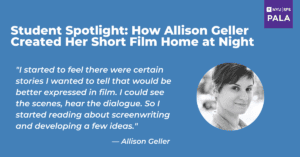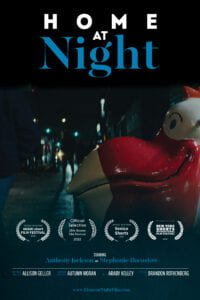Maybe you’ve always wanted to try your hand at screenwriting, but you didn’t know where to start. This was the case for Allison Geller, a professional writer and editor by day, who was also passionate about films and storytelling. In 2020, Geller took the NYU SPS PALA course, Writing and Directing the Short Film, taught by Rob Feld. In this course she started writing the first drafts of her short film, Home at Night. She’s since finished directing and producing the film, which has gone on to screen at the Boston Film Festival and will be screening at the New York Shorts International Film Festival on October 27th. We had the chance to talk to Geller about the process of making the film, and what’s next for her career!
When did your interest in screenwriting and directing begin? Was it something you always wanted to do?
AG: Actually, no! I’ve always been a writer, but my interest in screenwriting didn’t come until recent years. I studied poetry writing at the University of Virginia and have written quite a bit of non-fiction and fiction, and I’m also a copywriter by day, so words are just a big part of my everyday life. I started to feel there were certain stories I wanted to tell that would be better expressed in film. I could see the scenes, hear the dialogue. So I started reading about screenwriting and developing a few ideas.
In terms of directing, I realized it was a good combination of both my creative and organizational skills. Being a director is really about leading a team in order to get this mammoth project over the finish line—having the vision but also being able to execute it.
How did Rob Feld’s course, Writing and Directing the Short Film, inform your career today?
AG: I took Rob’s class virtually with a coworker sort of on a whim in the summer of 2020. It was a really fun and absorbing distraction from the rest of the dreary world at that time, watching movies, reading scripts, talking about how every line needs to drive the story or character development forward in some way. It was also a good introduction to the other aspects of film that were totally foreign to me, like basic shot types and how to think through shot progression in a sequence.
I wrote the first drafts of Home at Night in that class and I decided I wanted to actually make it. I don’t think I would have been motivated to do so if not for that class.
What did you find most valuable about Feld’s course?
AG: I found it most valuable to read and workshop other classmates’ scripts. I think a short film is not unlike a short story in that it can be a little bit more experimental and not as, let’s say, commercial as a feature film or novel. It doesn’t have to follow all the strict conventions of structure and plot. At the same time, it needs to hang together and make a kind of sense, even if that’s just in the mood or theme. So reading classmates’ scripts and discussing what worked and what didn’t and why, as well as suggestions for improvement, was really helpful. It’s always harder to identify those things about your own writing, but I think you get a little better at that over time, as well as better at asking the right questions when you get a critique.
It was also really valuable to have to write a director’s statement as it forced me to think through not only the themes I was exploring, but also the visual language, lighting, color, sound design—all of which pretty much carried through to the finished piece.
Where did the inspiration come for your recent short film “Home at Night?”
AG: I had the idea for the end of the film first. It occurred to me during one of many solitary walks home at night in my neighborhood in Astoria. As a woman, you always feel a little bit on guard in those moments. I thought, Wouldn’t it be interesting if…? (I won’t fill in the blank as that would give away the end of the film!) Then I worked backwards in terms of what kind of character this “would” happen to. That opened up a whole lot of other thematic preoccupations of mine: the power imbalance that exists between men and women, the isolation I see in society despite us being more technologically connected. It was also my way of parsing a lot of mediocre-to-bad experiences I had with online dating in New York City, and that I often talked about with friends here and elsewhere.
What do you hope audiences take away from this film?
AG: I hope it’s thought-provoking. Whether they like or hate it, if someone watches it and then talks about it with their friends after—what they think it means, their feelings about the protagonist, how they interpret the ending—I consider that a win.
Do you have any advice for aspiring filmmakers?
AG: My advice is to try to find people who are more experienced than you to help you, and then to find a way to just go for it. There’s always going to be a very good reason why you can’t do it: you don’t have any money, you don’t know anyone in the industry, et cetera. But you have to slowly build out your network and set funds aside for it, get a little help here and a little help there, and just make it any way you can. It doesn’t have to be today—it took me way longer than I’d expected or hoped to make Home at Night—but you have to make a plan and keep chipping away at it. It will be stressful and the end result won’t be perfect, but you will learn so much from the process and feel so satisfied to have actually done it!
What’s next for you? Tell us about any projects you’re looking forward to.
AG: I’m finishing up a feature-length screenplay in a different tone, but on a similar theme. It’s sort of a modern-day rom-com except it’s about a career-driven female protagonist who finally gets drawn into a relationship after a lot of casual flings only to be deeply disappointed by the guy. Which sounds depressing, but actually has a “happy ever after” ending in that she realizes that putting her feelings on the line was actually worthwhile, and that she wants to live her life like that from now on.
I’m also kicking around an idea for another short, so we’ll see. It’s taken a long time to recover from the first one, but now that I have, it’s hard not to think about making something new.
Get your tickets to Home at Night, which will be screening in person at the New York Shorts International Film Festival on October 27th at 8pm at Cinema Village. Follow @homeatnightfilm on Instagram for updates and additional screenings.


